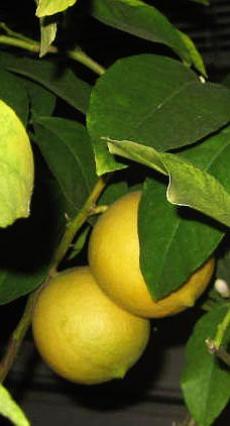
Lemons are the fruit of a small evergreen tree (Citrus x limon) that is native to Asia. Lemons are grown all over the world, and various parts of the fruit are used as a flavoring agent, an acidifier, a thickener for jellies and jams, cleaning agents, and antiseptics. Lemons contain a highly acidic [ingredient=lemon-juice juice] that is between 5 and 6 percent citric acid, which means that lemon juice has a pH of slightly below 3.
Historically, lemons were used for their antisceptic purposes and as an antidote to poisons, or grown ornamentally. While their range was originally limited to southeastern Asia, trade brought them to Europe in the first century CE, and to the Arab world by the seventh century CE. By the new milennium, lemons were being cultivated in the Mediterranean, and large scale cultivation began in Europe by the 1500's. Christopher Columbus brought lemon seeds to the new world and planted them on the island of Hispanola.In the mid-18th century, James Lind, a Scottish physician proved that lemon juice prevented scurvy, though his discovery went unadopted for nearly fifty years. It was around this time that lemons began to be used frequently in cooking and baking.
Lemons are an ovoid, yellow fruit with a thin, bright yellow rind, a white, tough, layer of pith, and a segmented fruit. Both the juice from the fruit and the [ingredient=lemon-peel peel] (or [ingredient=lemon-zest zest], when it is cut into thin strips) are used in cooking. Lemon juice is a fairly neutral acidifier, and not only balances sweetness in food and drink, but also cuts through richness or fat. The most common lemon in United States supermarkets is the Eureka, but Meyer lemons (a lemon x orange hybrid brought to the United States in 1908 by Frank Meyer) are also becoming popular. In Japanese cuisine, the yuzu (a cross between the Ichang papeda and the sour mandarin) has a vaguely lemony aroma and flavor, but is not related to the lemon at all.
Lemons are used heavily in Mediterranean and Middle Eastern cooking. Lebanese and Persian cuisine commonly preserved lemons in a brine, which changes their flavor quite a bit. Lemon seeds are high in pectin, which is useful when making jellies and jams from low-pectin fruit like strawberries -- the lemon seeds can be tied into a cheesecloth bag and cooked in the fruit to thicken it.
The characteristic aroma of whole lemons comes from the peel, which is mainly limonene, beta-pinene, and gamma-terpinene, with neral and geranial also contributing some scent. Lemon juice contains alpha and beta-pinene and some limonene.
Lemons have a distinctly fresh, clean aroma and a sharp, neutral sour flavor that make them ideal for cocktail use. Lemon juice can be used to balance sweet flavors in a drink, while the heady aroma of lemon peel or zest makes for a classic garnish.
Some popular cocktails containing Lemon
- Church Bay Cooler — Gold rum, Sherry, Vanilla Soda water, Passion fruit syrup, Lemon juice, Mint, Lemon
- Oona O'Neill — Whiskey, Amaro, Oloroso sherry, Orange bitters, Lemon
- Boston Iced Tea Party — Gin, Tea, Ginger-Honey Syrup, Lemon
- Cutman — Herbal liqueur, Swedish Punsch, Apricot liqueur, Lemon, Mint, Salt
- Oakland Iced Tea — Fernet Branca, Rye, Vodka, Gin, Rum, Orange liqueur, Peychaud's Bitters, Bitters, Meyer lemon juice, Sugar cube, Lemon, Thai Basil
- Charles Dickens Lemon Milk Punch — Brandy, Rum, Water, Milk, Pineapple, Sugar, Tea, Lemon, Cinnamon, Cloves, Coriander seeds
- Death in Missolungi — Gin, Mastika, Pine liqueur, Lemon
- The Delicious Cobbler — Amaro Montenegro, Amontillado Sherry, Ramazzotti, Pineapple juice, Honey syrup, Lemon, Orange
- Rudolph's Nose — Mezcal, Maraschino Liqueur, Herbal liqueur, Swedish Punsch, Lemon, Hibiscus syrup
- Haiti Cocktail (Elvezio Grassi) — Amaro, Demerara Rum, Dry vermouth, Sweet vermouth, Campari, Bitters, Lemon